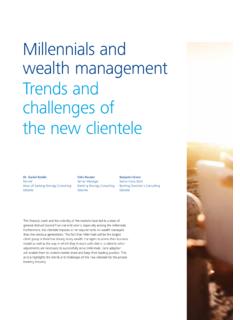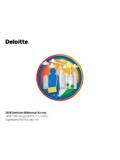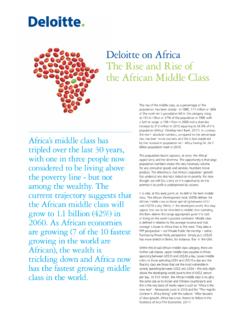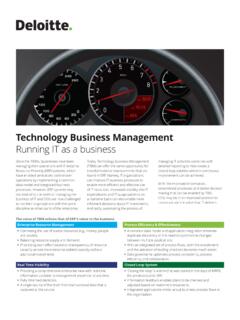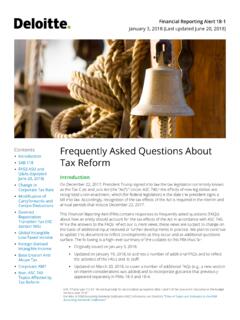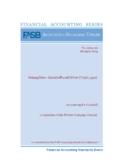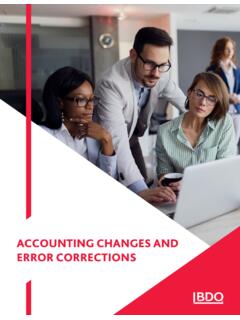Transcription of Accounting for investment in associates (Part 2)
1 An entity with significant influence over, or joint control of, an investee should account for its investment in an associate or a joint venture using the equity method except when the investment qualifies for 28 defines the equity method as a method of Accounting whereby the investment is initially recognised at cost and adjusted thereafter for the post-acquisition change in the investor's share of net assets of the investee. The profit or loss of the investor includes the investor's share of the profit or loss of the investee, and the investor's other comprehensive income includes its share of the investee's other comprehensive 28 justifies the use of the equity method by noting that the recognition of income on the basis of distributions received may not be an adequate measure of the income earned by an investor on an investment in an associate or a joint venture because the distributions received may bear little relation to the performance of the associate or joint venture.
2 Because the investor has joint control of, or significant influence over, the investee, the investor has an interest in the associate's or joint venture's performance and, as a result, the return on its investment . It is therefore appropriate for the investor to account for this interest by extending the scope of its financial statements to include its share of the profit or loss of such an investee. As a result, application of the equity method provides more informative reporting of the investor's net assets and profit or loss. The equity method is used whether or not the investor, because it also has subsidiaries, prepares consolidated financial statements. However, the investor does not apply the equity method when presenting separate financial equity methodAccounting for investment in associates (Part 2)Application of the equity methodUnder the equity method, an investment is initially recognised at cost, and the carrying amount is adjusted thereafter for: ?
3 ? the investor's share of the post-acquisition profits or losses of the investee, which are recognised in the investor's profit or loss; and?? distributions received from the investee, which reduce the carrying amount of the to the carrying amount may also be necessary for changes in the investor's proportionate interest in the investee arising from changes in the investee's other comprehensive income (such as the impact of property revaluations and some exchange differences). The investor's share of those changes is recognised in other comprehensive income of the investor's share of the investee's profits or losses after acquisition is also adjusted to take account of items such as additional depreciation of depreciable assets based on their fair values at the acquisition date. Similarly, appropriate adjustments to the investor's share of the associate's or joint venture's profit or loss after acquisition are made for impairment losses such as for goodwill or property, plant and equipment.
4 IAS 28(2011):10 specifies that the investment in an associate or joint venture accounted for using the equity method is initially recognised at cost. Generally, cost includes the purchase price and other costs directly attributable to the acquisition or issuance of the asset such as professional fees for legal services, transfer taxes and other transaction costs. Therefore, the cost of an investment in an associate or joint venture at initial recognition comprises the investment 's purchase price and any directly attributable expenditure necessary to acquire it. This applies to both the consolidated This publication contains general information only and Akintola Williams Deloitte is not, by means of this publication, rendering Accounting , business, financial, investment , legal, tax, or other professional advice or refers to one or more of Deloitte Touche Tohmatsu Limited, a UK private company limited by guarantee, and its network of member firms, each of which is a legally separate and independent entity.
5 Please see for a detailed description of the legal structure of Deloitte Touche Tohmatsu Limited and its member firms. Akintola Williams Deloitte a member firm of Deloitte Touche Tohmatsu Limited, provides audit, tax, consulting, Accounting and financial advisory, corporate finance and risk advisory to public and private clients spanning multiple industries. Please visit us at 28 defines the equity method as a method of Accounting whereby the investment is initially recognised at cost and adjusted thereafter for the post-acquisition change in the investor's share of net assets of the investee. financial statements of the investor and the separate financial statements, when IFRS 3 Business Combinations requires the costs associated with acquiring a subsidiary to be recognised as an expense in consolidated financial statements, this has not changed the appropriate treatment of the costs incurred in acquiring an associate or a joint ownership interestThe investor's share of the profits or losses of the investee, or other changes in the investee's equity, is determined on the basis of its proportionate ownership interest.
6 The investor generally recognises its share of the investee's earnings and losses based on the percentage of the equity interest owned by the investor. However, when agreements designate allocations among the investors of profits and losses, certain costs and expenses, distributions from operations, or distributions upon liquidation that are different from ownership percentages, recognising equity method income based on the percentage of the equity interest owned may not be appropriate. The substance of these agreements should be reflected in determining how an increase or decrease in net assets of the investee will affect cash payments to the investor over the life of the investee and upon its voting rightsWhen potential voting rights or other derivatives containing potential voting rights exist , only the investor's existing ownership interests are taken into account in determining the investor's share of the investee's profits or losses.
7 That share does not reflect the possible exercise or conversion of potential voting rights and other derivative of profits or lossesIn some circumstances, an entity has, in substance, an existing ownership as a result of a transaction that currently gives it access to the returns associated with an ownership interest. In such circumstances, the proportion allocated to the entity is determined by taking into account the eventual exercise of those potential voting rights and other derivative instruments that currently give the entity access to the a general principle, IFRS 9 Financial Instruments does not apply to interests in associates and joint ventures that are accounted for using the equity method. Nor does it apply to instruments containing potential voting rights that in substance currently give access to the returns associated with an ownership interest in an associate or a joint venture.
8 However, in all other cases, instruments containing potential voting rights in an associate or a joint venture are accounted for in accordance with IFRS of group interestsWhen the investor is a parent, the group's share of the investee is the aggregate of the holdings in that investee by the parent and its subsidiaries. The holdings of the parent's other associates and joint ventures are ignored for this an associate or a joint venture has subsidiaries, associates or joint ventures, the profit or loss, other comprehensive income and net assets taken into account in applying the equity method are those recognised in the associate's or joint venture's financial statements (including the associate's or joint venture's share of the profit or loss, other comprehensive income and net assets of its associates and joint ventures), after any adjustments necessary to give effect to uniform Accounting , when the associate or joint venture is itself a group of entities and prepares consolidated financial statements, these consolidated financial statements will be used in applying the equity method.
9 When the associate or joint venture does not prepare consolidated financial statements, because it has associates and/or joint ventures but no subsidiaries, the starting point for applying the equity method should be the financial statements that account for those associates and/or joint ventures using the equity method, rather than any separate financial a general principle, IFRS 9 Financial Instruments does not apply to interests in associates and joint ventures that are accounted for using the equity methodHelping our clients increase value . Accounting standards in Nigeria and internationally are changing at an unprecedented pace and are becoming increasingly complex. In addition, creating a sound financial platform requires careful analysis and an in-depth knowledge of each organization's unique circumstances.
10 With a network of experts and deep technical skills in Nigeria and abroad, our professionals provide superior Accounting and financial advice for every type of business, in every industry, and in every situation, including: Accounts preparation and reporting, Book keeping, Accounts reconciliation and reconstruction, Consolidation of group accounts and Internal control over financial is the partner-in-charge ofAccounting and Financial Advisoryin Akintola Williams Deloitt
